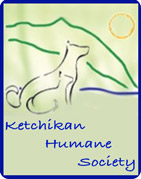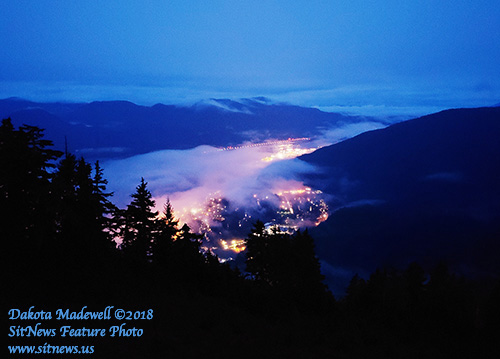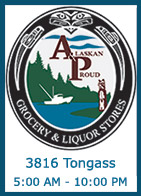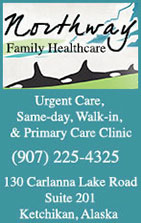










Weekly Specials
Online Shopping; Pickup or Delivery |
|










 Contact Contact 
 Webmail
Letters Webmail
Letters
 News Tips News Tips
 Copyright Info Copyright Info
 Archives Archives
Quick News
Search
 Alaska Alaska
 Ketchikan Ketchikan
 SE Alaska SE Alaska
Columns
- Articles
 Dave Kiffer Dave Kiffer
 Money Matters Money Matters
Historical
Ketchikan
 June Allen June Allen
 Dave
Kiffer Dave
Kiffer
 Louise
B. Harrington Louise
B. Harrington
Sports
 Ketchikan Links Ketchikan Links
Public Records
 FAA Accident Reports FAA Accident Reports
 NTSB
Accident Reports NTSB
Accident Reports
 Court Calendar Court Calendar
 Recent Filings & Case Dispositions Recent Filings & Case Dispositions
 Court Records Search Court Records Search
 Sex Offender Reg. Sex Offender Reg.
 Public Notices Public Notices
 Alaska Recall Alerts Alaska Recall Alerts
 Recalls.gov Recalls.gov
 AST Daily Dispatch AST Daily Dispatch
 KTN
Police Reports KTN
Police Reports
 Juneau Police Reports Juneau Police Reports
Weather,
Webcams
 Today's
Forecast Today's
Forecast
 KTN
Weather Data KTN
Weather Data
 AK
Weather Map AK
Weather Map
 AK Weathercams AK Weathercams
 AK Earthquakes AK Earthquakes

|
|

Thursday
November 29, 2018

|
Deer Mountain Morning
Ketchikan's early morning lights as viewed from Deer Mountain.
Front Page Feature Photo By DAKOTA MADEWELL ©2018
|
|
Southeast Alaska: 9th Circuit Court Voids Four Timber Sales in Tongass National Forest - A memorandum decision (written decision) of the 9th Circuit Court of Appeals has invalidated four U.S. Forest Service (USFS) logging projects in Alaska's Tongass National Forest, the nation's largest national forest, ending a ten year legal battle. Greenpeace USA and Cascadia Wildlands filed the suit in 2008.
The plaintiffs say the court's decision stops four timber sales that would have clearcut 1,700 acres of old-growth rainforest - habitat that is critical to deer, which are the primary prey of the rare Alexander Archipelago wolf (or "Islands Wolf"), and vital to subsistence hunters. The lawsuit focused on all three -- deer, wolves, and hunters.
In 2016, the U.S. Fish and Wildlife Service denied Endangered Species Act protection to Alaska’s Alexander Archipelago wolf. And according to the Alaska Department of Fish and Game, the Alexander Archipelago wolf is a subspecies of the gray or timber wolf found in southeast Alaska.
The plaintiffs won on grounds of both the National Forest Management Act (NFMA) and National Environmental Policy Act (NEPA).
"But the victory is for more than deer, wolves and hunters," said Larry Edwards, a representative of Greenpeace and resident of Sitka, Alaska. "It also protects many other kinds of wildlife in those areas, diverse forest uses, and carbon that is stored in the soil, trees and vegetation. As a far-north coastal rainforest, fires are rare and very small here, and as a result the Tongass is world-renown for storing carbon in its soil, trees and vegetation."
At issue in the litigation was how the Forest Service determined impacts of the logging projects on Sitka black-tailed deer, and consequently wolves and hunters.
The Court concluded that the agency's modeling of deer winter habitat "does not accurately measure forest structure [and] was too unreliable to be used." It also said the "USFS failed to explain why it was authorizing the projects despite lower-than-recommended deer habitat capabilities." (The recommended minimum capability is specified in the Tongass Forest Plan.)
In voiding the agency's approvals of its four projects, the court noted that in "over a decade of litigation ... USFS has been given multiple opportunities to correct flaws in its project analysis and ignored the court's guidance."
"The Forest Service was handed a clear message today [Wednesday] that it cannot fudge the science in order to give its projects an 'easy pass' and sell excessive amounts of timber from a planning area," said Chris Winter of Crag Law Center, one of the plaintiffs' attorneys. "The Islands Wolf is a rare species in Alaska's rainforest, and it's vital that the agency follow the best science on how to protect it and how to provide for the needs of deer hunters."
"The Forest Service has scheduled two of the projects in our lawsuit to be logged in 2019. The court's verdict invalidating the decisions comes just in time." said Gabriel Scott of Cascadia Wildlands. - More...
Thursday PM - November 29, 2018
Alaska: Alaska Roadless Rule Citizen Advisory Committee submits final report - The Alaska Roadless Rule Citizen Advisory Committee has finalized a report for the State of Alaska to consider when providing input on state-specific Roadless Rule for the Tongass National Forest. The State is one of several cooperating agencies working with the U.S. Forest Service as it prepares a draft environmental impact statement (DEIS) for the state-specific rule.
The committee was established by Governor Bill Walker to advise the State on future management of inventoried roadless areas in the Tongass. Members were appointed by Governor Walker in late September and asked to submit a report to the State by late November. The committee’s report is available online and has been shared with the Forest Service as part of the ongoing cooperating agency review.
Last week Governor Walker met with the committee to discuss the report. He praised the committee for its dedicated efforts over the past two months to gather public input and develop options. “It is critical to include local stakeholders in the development of land management decisions that impact them,” Governor Walker said.
The committee included representatives from the Alaska Native community, conservation organizations, local communities, and various industries, including mining, timber, tourism, energy, and commercial fishing. The committee hosted public meetings in Juneau, Ketchikan, and Sitka, and considered written and oral public comments to ensure its deliberations accounted for a wide range of perspectives in the region.
The committee developed four options in its final report. All four options would allow roadbuilding and associated tree cutting in roadless areas of the Tongass for projects associated with transportation and utilities, mining, hydroelectric and other renewable energy, cultural uses, and habitat and forest health improvement. The options also include removing certain locations from the roadless inventory to allow for commercial timber harvest and other economic development activities, while retaining or designating additional areas for conservation of their roadless values. These four options would be in addition to a “no-action” alternative that keeps the current national Roadless Rule in place, and an alternative restoring a full exemption of the Tongass from the national rule. - More...
Thursday PM - November 29, 2018
|
|
Alaska: Statewide Opioid Action Plan Offers Blueprint to Control Alaska’s Opioid Epidemic - The Alaska Department of Health and Social Services released the 2018-2022 Statewide Opioid Action Plan this week, offering a collaborative blueprint for DHSS, other state agencies and partner organizations to follow in the continued work to control Alaska’s opioid epidemic.
The five-year action plan, compiled by the Office of Substance Misuse and Addiction Prevention (OSMAP), was developed with broad input from multiple agencies and community partners. Feedback was gathered from at least 300 diverse Alaskans at stakeholder meetings and community cafés in more than a dozen Alaska communities over the past year. A final community summit in August 2018, coordinated by the Advisory Board on Alcoholism and Drug Abuse (ABADA), the Alaska Mental Health Trust and DHSS, brought together nearly 100 Alaskans from over 80 agencies and community organizations to provide final input for the action plan.
“This plan reflects an Alaska grown, ground-up approach that reaches far beyond the work of the current administration and state government,” said DHSS Commissioner and Chief Medical Officer Dr. Jay Butler. “The causes of this epidemic are complex and we must work with everyone – health care providers, local agencies, Tribal entities, law enforcement, community groups, individual citizens and national partners – toward solutions. This plan provides a template for communities and all of us to follow moving forward.”
“This process started at the community level with people who were directly affected by the opioid epidemic,” added Michael Carson, Chair of the Mat-Su Opioid Task Force and Vice President and Recovery Specialist at My House, an organization that serves homeless youth in Wasilla. “The process was unique in that it was such a grassroots effort. That bottom-up approach was vital and incredibly effective.”
Nationwide and in Alaska, the opioid epidemic has become known as this decade’s defining public health crisis. During 2010-2017, with 623 identified overdose deaths, the opioid overdose death rate in Alaska increased by 77 percent (from 7.7 per 100,000 persons in 2010 to 13.6 in 2017). Preliminary data for 2018 indicate that the ongoing response may be having an impact: During the first six months of 2018, 29 Alaskans died of opioid overdose, compared with 44 opioid overdose deaths during the first six months of 2017. - More...
Thursday PM - November 29, 2018
Ketchikan: Ketchikan Reentry Coalition Launches Service to Reintegrate Formerly Incarcerated into Community - According to the Alaska Department of Corrections (ADOC), 66% of individuals incarcerated in the state of Alaska go on to commit new crimes after being released, a recidivism rate of two out of three. This tracks closely with the 65% rate of incarcerated Alaskans rates of behavioral health issues and disabilities experienced by our prison population, resulting in ADOC serving as the single largest provider of mental health services in the state. Many individuals returning to their communities, termed reentrants, struggle to find housing, employment, treatment services, transportation, and a healthy community to connect with. In addition, legal barriers, lack of skills and training, and stigma against the formerly incarcerated increase the difficulty in accessing what resources and services are availability, all of which contributes to that low rate of success in transitioning back to their communities.
The Ketchikan Reentry Coalition (KRC) seeks to engage the public in taking ownership of the problem of recidivism, creating a safer community that supports the reintegration of reentrants, giving them the tools and resources they need to successfully reconnect with and contribute to Alaska’s First City. |
Community assessments conducted by the Ketchikan Reentry Coalition found that Ketchikan does have resources available for reentrants, but these resources are spread across a variety of different non-profits, support groups, church associations, state departments, etc. Each of these different organizations can often have wildly varying means for accessing those resources. For these reasons, the Ketchikan Reentry Coalition has developed a new non-clinical support service - called Reentry Navigation - specifically focused on assisting reentrants as they transition back to the community.
The KRC Reentry Navigation Service is a six-month transitional support program designed to help reentrants obtain the services and resources they need while ensuring accountability and community safety. Each client is assigned a Reentry Navigator who will assist the client with creating a transition plan, identifying needs and goals, and accessing services and supports available in the Ketchikan area. Regular check-ins with the navigator and coordination between service providers via a cross-agency care team provide support to the client, helping them achieve their goals and transition to independence successfully, benefiting themselves and our community. - More...
Thursday PM - November 29, 2018
Ketchikan: Where do all the socks go? Sock drive begins again By Shaun Pickens and Sandra Kinzer
- It’s that time of year, when the weather gets colder and people begin to decorate for the holidays. Along with the holiday spirit, we begin to see many food and donation boxes placed around the community.
Through its Holiday Sock Drive, Community Connections is again inviting folks to help make this holiday season a little brighter. Donations welcomed include new socks and outerwear, gloves, coats, mittens, scarves, hats… anything warm! Your generoud donation will be delivered to a thankful recipient.
But who are these recipients? Here’s a story of one of them.
A young Ketchikan man who enjoyed hunting was involved in a car accident and suffered a traumatic brain injury and was transferred to a hospital in Colorado. When he was released, he was referred to Community Connections in Ketchikan where staff determined that he might receive better care if he was part of an inpatient rehabilitation program. As Alaska does not this type of program, the young man was referred to a program in the lower 48. However, that rehabilitation program did not meet his needs and upon release he returned to Ketchikan. Unfortunately most of his belongings were lost during the transfer and he returned home with many missing items. This repeated again - he was sent down south only to be returned again to Ketchikan with most of his belongings again lost in the transition.
Today, he has an apartment and is making progress in his rehabilitation. He can’t go out hunting right now, but is glad to be back home in Alaska. However, he is still in need of clothes and other basic necessities. Through the sock drive Community Connections will be able to replace some of his belongings, including socks and outerwear that are crucial during the Southeast Alaska winter. - More...
Thursday PM - November 29, 2018 |
MATT MACKOWIAK: Lame Duck Congress Should Roll Back Disastrous Health Tax - The issue of Obamacare's hidden health insurance tax has been widely debated over the years, but it has taken on additional urgency yet again.
At a time when the economy is booming and wages are rising for the first time in more than 10 years, Congress should act immediately to prevent a new headwind from forming.
A quick reminder: The tax, known as the HIT, was a hidden and unnecessary tax inserted into the original Obamacare legislation. Even President Obama recognized the tax as harmful and unnecessary - he signed a bill that delayed its implementation through 2017. But now the expiration deadline is looming and the tax is back. Congress should move quickly to prevent health insurance premiums from increasing due to their inaction.
Health insurance premiums for 2020 are set now, in the fall of 2018. For as long as the HIT is around, insurance agencies will bake in this tax to premiums and pass the cost on to consumers. This is a fact.
From a political standpoint, repealing the HIT is a slam dunk. Employers, employees and families - no one benefits from this tax. Repealing the unnecessary HIT frees up hundreds of dollars annually for families.
This is also a way Congressional Republicans can roll back the HIT while moving closer to keeping their long-delayed promise to repeal Obamacare. While the HIT is an ingeniously clever device within Obamacare, repealing it continues to meaningfully chip away at the massive health care legislation.
Politics aside, HIT directly affects employers, seniors, families and consumers across America. Oliver Wyman, an international management consulting company, has released actuarial analysis on the HIT and the effects on specific markets.
The report estimates that some 152,000 and 286,000 private sector jobs will be lost by 2023 due to HIT, with increased premiums of $479 for families with small group coverage at small businesses. Seniors will see premiums increase annually at a similar amount - $482, which takes a toll on a fixed income. - More...
Thursday PM - November 29, 2018
|

Political Cartoon: Climate Report
By Pat Bagley ©2018, The Salt Lake Tribune, UT
Distributed to paid subscribers for publication by Cagle Cartoons, Inc.
Open Letter to PeaceHealth CEO, Liz Dunne - Recently I was walking by a PeaceHealth satellite office here in Ketchikan that is located in the Plaza shopping center. I noticed flyers taped to the window of this office and I had to do a double take. Even though the event advertised has come and gone, the contradiction of a hospital advertising “Beer and Brats” needs to be addressed.
How on earth can an organization whose mission is "promoting personal and community health (and) relieving pain and suffering" promote an event that encourages people to "come and bend an elbow?"
It is hard to believe that there was a recent community event in this same Plaza that profiled brave young people testifying how they have fought to overcome their alcohol and drug addictions.
This community, like many others in Alaska, continues to have extensive issues with alcoholism, drug abuse, and subsequent homelessness. I see the effects of alcoholism just about every day in this small town. I have even had friends locally die of the disease despite my efforts to help them. For a hospital to promote such an event as this gives the perception that those in the medical community not only encourage the illness, but they also stand ready to provide and charge for the care. - More...
Tuesday PM - November 20, 2018
Lifting the ‘Roadless Rule’: Unique opportunity for Southeast Alaskans By
Heidi Hansen, Deputy Commissioner DNR - From the North Slope to the Panhandle, and the Interior to the Peninsula, rural Alaskans are prioritizing their access – to each other, the rest of Alaska and the world.
Cost is often the limiting factor. But not always.
Many community leaders want to improve access without jeopardizing the unique character and resources of their communities. It’s literally a fight for survival for some small communities. For others, it’s part of a long-term plan to become more sustainable. - More...
Saturday PM - November 17, 2018
 |
Proposed Distillery at The Old Firehouse By
Shauna Lee - Finally, after a long period of stagnation, I’ve seen the spark of change here in Ketchikan and it’s made me feel quite optimistic about our future. Businesses like Nibliks, SoHo Coho, Chinook and Company and Ketchikan Dry Goods have brought new life into the downtown core with their updated design aesthetic and merchandise that encourages our local dollars to stay local. Venues like the New York Café, the Bawden Street Brewery and the Fish House have brought us new menu offerings and the opportunity to eat, drink and be merry right here in our hometown. It’s an exciting time for the First City and I feel like we are on the precipice of a new era where we leave old outdated ideas behind and embrace what our future could be. So how do we keep this momentum going?
As a business person I have learned over the years that I am more successful when I reach out to other local businesses and organizations. Working with my fellow colleagues rather than against them, has been a recipe for success. I want to help other companies become successful because when their boat rises, I get to ride the same high tide. That is why I want to encourage the City of Ketchikan to support the proposed distillery at the old Ketchikan Fire Department location. - More...
Friday PM - November 09, 2018
 Webmail your letter or Webmail your letter or
 Email Your Letter To: editor@sitnews.us Email Your Letter To: editor@sitnews.us
|
Articles &
photographs that appear in SitNews may be protected by copyright
and may not be reprinted or redistributed without written permission
from and payment of required fees to the proper sources.
E-mail your news &
photos to editor@sitnews.us
Photographers choosing to submit photographs for publication to SitNews are in doing so, granting their permission for publication and for archiving. SitNews does not sell photographs. All requests for purchasing a photograph will be emailed to the photographer.
|
|
















The Local Paper is
available online.
Click here for this week's printed edition (PDF)

|
|

![]() Contact
Contact ![]()
![]() Webmail
Letters
Webmail
Letters![]()
![]() News Tips
News Tips![]()
![]() Copyright Info
Copyright Info![]() Archives
Archives![]() Alaska
Alaska![]() Ketchikan
Ketchikan![]() SE Alaska
SE Alaska![]() Dave Kiffer
Dave Kiffer![]() Money Matters
Money Matters ![]() June Allen
June Allen![]() Dave
Kiffer
Dave
Kiffer![]() Louise
B. Harrington
Louise
B. Harrington ![]() Ketchikan Links
Ketchikan Links![]() FAA Accident Reports
FAA Accident Reports ![]() NTSB
Accident Reports
NTSB
Accident Reports![]() Court Calendar
Court Calendar![]() Recent Filings & Case Dispositions
Recent Filings & Case Dispositions ![]() Court Records Search
Court Records Search![]() Sex Offender Reg.
Sex Offender Reg.![]() Public Notices
Public Notices![]() Alaska Recall Alerts
Alaska Recall Alerts![]() Recalls.gov
Recalls.gov![]() AST Daily Dispatch
AST Daily Dispatch![]() KTN
Police Reports
KTN
Police Reports![]() Juneau Police Reports
Juneau Police Reports ![]() Today's
Forecast
Today's
Forecast![]() KTN
Weather Data
KTN
Weather Data![]() AK
Weather Map
AK
Weather Map![]() AK Weathercams
AK Weathercams![]() AK Earthquakes
AK Earthquakes








































